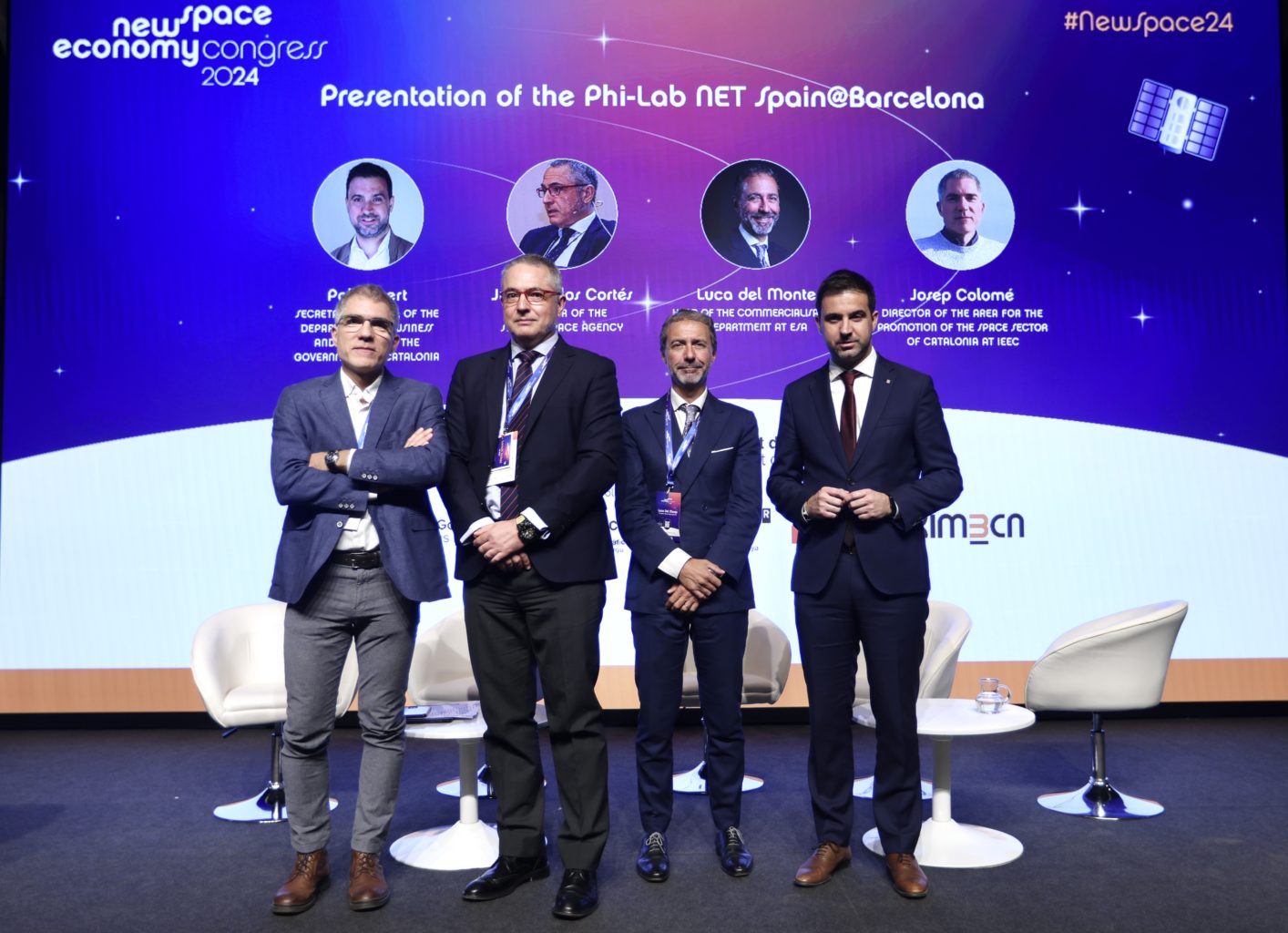
Keep up to date with our innovative initiatives.
Sign up here
On October 1st, the Phi-Lab NET Spain, a new infrastructure dedicated to boosting space innovation within the ScaleUp Programme of the European Space Agency (ESA), was presented in the NewSpace Economy Congress 2024 framework.
Following the ESA CM22 Ministerial Council meeting, 23 ESA Member and Associate States committed a total of 117.6 million euros to the ScaleUp programme and, thanks to the support of the Spanish Government, the Ministry of Science, Innovation and Universities, through the Spanish Space Agency, has contributed 12 million euros to the programme, the Spanish Phi-Lab will have an annual co-financing model that will provide 1.1 million euros for projects. This funding will foster collaboration between academia, research centres, industry and investment entities.
The launch of the Phi-LabNET Spain in Barcelona, which will form part of the Phi-Lab NET, represents a fundamental pillar of the ScaleUp Programme, an initiative designed to accelerate the commercialisation of space and foster the growth of private investment in the space sector.
Within the framework of the call launched by ESA, the proposal coordinated by the Institute of Space Studies of Catalonia (IEEC — Institut d’Estudis Espacials de Catalunya) to host a Phi-Lab in Barcelona, focused on space technologies and their application to boost climate resilience, was the winner and was awarded at the beginning of September. The programme will have an important co-funding from the consortium entities, whose main contribution comes from the Government of Catalonia, with more than 8 million euros, through the three entities that collaborate in the deployment of the NewSpace Strategy of Catalonia: the IEEC, the i2CAT Foundation and the Cartographic and Geological Institute of Catalonia (ICGC).

From left to right, Josep Colomé, director of the Area for the Promotion of the Space Sector of Catalonia at the IEEC; Juan Carlos Cortés, director of the Spanish Space Agency and vice-president of the ESA Council; Luca del Monte, head of Commercialisation Department at ESA, and Pol Gibert, secretary general of the Department of Business and Work of the Government of Catalonia. Credits: Government of Catalonia.
Phi-LabNET Spain@Barcelona was presented with the interventions of Mr Juan Carlos Cortés, Director of the Spanish Space Agency (AEE, by its acronym in Spanish) and Vice-President of the ESA Council; Mr Luca del Monte, Head of Commercialisation Department at ESA; Mr Josep Colomé, Director of the Area for the Promotion of the Space Sector of Catalonia at the IEEC; and Mr Pol Gibert Horcas, Secretary General of the Department of Business and Work of the Government of Catalonia. All of them have underlined the relevance of this new infrastructure for the national space ecosystem.
Phi-LabNET Spain will be located in the RDIT building of the ‘Parc Mediterrani de la Tecnologia’ in Castelldefels, Barcelona, where the IEEC and ESA-BIC Barcelona are also located. This new centre will be dedicated to support innovative and disruptive projects through calls for proposals led by the winning consortium, headed by the IEEC and composed of the i2CAT Foundation, the Cartographic and Geological Institute of Catalonia (ICGC), Fundación General CSIC, Knowledge Innovation Market Foundation (KIM), ARRIBES Enlightenment, Universitat de València (UVEG), Universitat Politècnica de Catalunya (UPC), Barcelona Supercomputing Centre (BSC-CNS), Ricardo Valle Institute of Innovation (IRV), ESA’s MELiSSA Pilot Plant, located at the Universitat Autònoma de Barcelona, and the Institut de Ciències Fotòniques (ICFO). The programme will support both academic entities and the state space industry.
With the mission to bring innovation and application together, a variety of services will be offered ‘under one roof’, Phi-LabNET will facilitate the way for pioneering ideas to reach the market, thus supporting Spain in its goal to become a European leader in space exploration and technology. Phi-LabNET Spain will offer, in addition to funding and a large knowledge network, IP management, technical support, access to infrastructure and business coaching. It will provide comprehensive support to all selected projects.